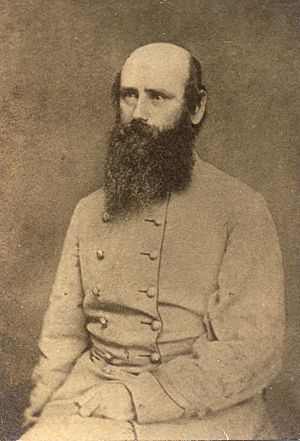Richard Thomas Walker Duke facts for kids
Quick facts for kids
Richard T. W. Duke
|
|
|---|---|
 |
|
| Member of the Virginia House of Delegates from Albemarle County | |
| In office December 3, 1879 – December 7, 1881 Serving with T. L. Michie
|
|
| Succeeded by | John B. Moon |
| Member of the U.S. House of Representatives from Virginia's 5th district |
|
| In office November 8, 1870 – March 3, 1873 |
|
| Preceded by | Robert Ridgway |
| Succeeded by | Alexander Davis |
| Personal details | |
| Born | June 6, 1822 Charlottesville, Virginia |
| Died | July 2, 1898 (aged 76) "Sunny Side," Charlottesville, Virginia |
| Resting place | Maplewood Cemetery, Charlottesville, Virginia |
| Political party | Conservative |
| Other political affiliations |
Funder (in 1880s) |
| Profession | lawyer |
| Military service | |
| Allegiance | |
| Branch/service | |
| Rank | |
| Unit | |
| Battles/wars | American Civil War |
Richard Thomas Walker Duke Sr. (born June 6, 1822 – died July 2, 1898) was an important lawyer and politician from Virginia in the 1800s. He also served as a congressman.
Contents
Early Life and Education
Richard T. W. Duke was born near Charlottesville, Virginia. His parents were Elizabeth Morris Kendrick and Francis Edward Duke. His father was a planter, which means he owned and managed a large farm.
Richard received a private education when he was young. After his father passed away, he went to Lexington, Virginia for more studies. He graduated from the Virginia Military Institute in 1844. Later, he studied law in Charlottesville. He earned a law degree from the University of Virginia in 1850.
Starting His Career
After finishing law school, Duke became a lawyer in Virginia in 1850. He started his own law practice. In 1854, he was elected as an alderman for Charlottesville. An alderman is like a city council member who helps run the town.
Duke also helped manage his family's farm. The farm used enslaved people for labor. In 1858, he was elected as the Commonwealth's Attorney for Albemarle County, Virginia. This job meant he was the chief prosecutor for the county. He kept this role until 1869, even during the Civil War.
Service During the Civil War
In November 1859, after John Brown's raid on Harpers Ferry, Duke helped create a local military group called the Albemarle Rifles. When Virginia decided to leave the United States and join the Confederacy, Duke joined the army on May 8, 1861.
His company became part of the 19th Virginia Infantry. They fought in the First Battle of Bull Run, also known as the First Battle of Manassas. Duke was praised for his actions in this battle. However, he later became sick and was not re-elected as captain in 1862.
Leading the 46th Virginia Infantry
In May 1862, Duke was elected as a Colonel for the 46th Virginia Infantry. This regiment had lost many soldiers in earlier battles and from sickness. Duke's new troops were part of Wise's Brigade, led by General Henry A. Wise.
His brigade mostly stayed on the Virginia Peninsula. They watched for Union troop movements on the James River. Colonel Duke stayed in this rank until March 1864. He resigned because of disagreements with his commander, General Wise.
Defending Richmond
In May 1864, Duke took on a new role as Lieutenant Colonel. He commanded the 1st Virginia Reserves Battalion. This unit helped defend the Confederate capital, Richmond, during the last year of the war.
His battalion guarded prisoners at Belle Isle and Libby Prison. They also manned trenches at Fort Harrison. When the Confederate forces left Richmond on April 3, 1865, Duke's unit helped set fire to public warehouses as ordered. Lieutenant Colonel Duke and many of his troops were captured at the Battle of Sailor's Creek.
After the War
After being released from prison in July 1865, Duke went back to Charlottesville. He started farming again and continued his law practice.
In 1869, Virginia rejoined the United States. A fellow Conservative Party member, Robert Ridgway, was elected to the U.S. House of Representatives but sadly died soon after. Duke won a special election to take his place. In 1870, he won another election against Alexander Rives.
In 1873, Alexander Davis replaced Duke as congressman. However, voters in Albemarle County elected Duke again to the Virginia House of Delegates in 1879 and 1880.
In his later years, around 1899, Duke began writing down his memories. He wrote about Charlottesville and Albemarle County for his children and grandchildren. These writings eventually filled five books and are now kept at the University of Virginia library.
Death and Legacy
Richard T. W. Duke died at his home called "Sunny Side" near Charlottesville, Virginia on July 2, 1898. He was buried in Maplewood Cemetery in Charlottesville. His family's important papers are preserved at the University of Virginia library.
Electoral History
1870 - Duke was elected to the U.S. House of Representatives without anyone running against him in both a special election and the general election.
 | Jewel Prestage |
 | Ella Baker |
 | Fannie Lou Hamer |

